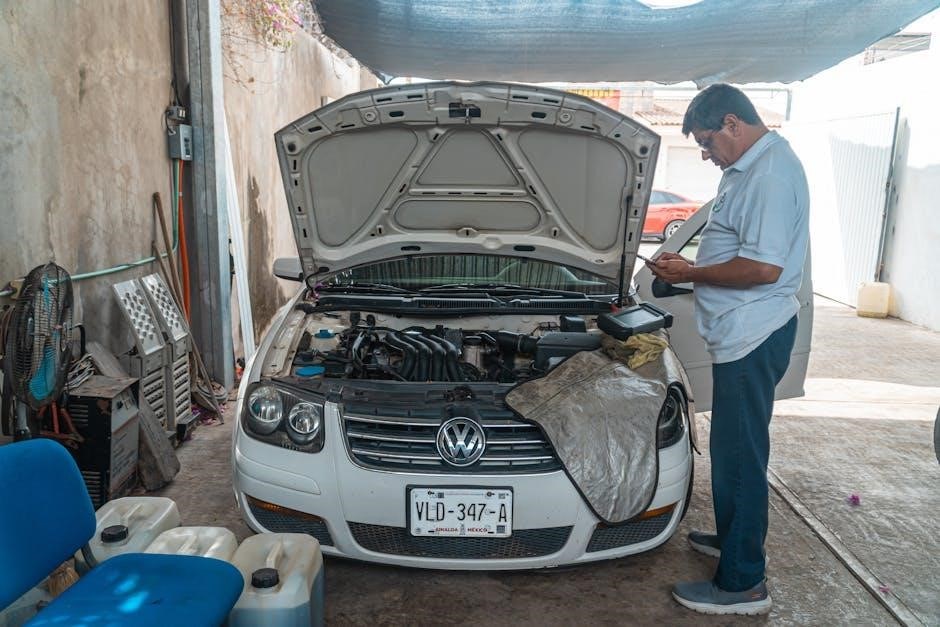
The VW Atlas maintenance schedule ensures optimal performance and longevity. Regular services include oil changes, tire rotations, and brake inspections, tailored to specific mileage or time intervals annually.
1.1 Overview of the VW Atlas Maintenance Schedule PDF
The VW Atlas maintenance schedule PDF provides a comprehensive guide for owners to keep their vehicle in optimal condition. It outlines recommended service intervals, such as oil changes, tire rotations, and brake inspections, at specific mileage or time markers. The PDF also includes adjustments for severe driving conditions, ensuring tailored care for different usage scenarios. By following the schedule, owners can prevent potential issues and maintain their vehicle’s performance. The document is readily available online or through authorized dealerships, making it easy for owners to access and adhere to the recommended maintenance plan for their VW Atlas. Regular updates ensure accuracy.
1.2 Importance of Regular Maintenance for VW Atlas
Regular maintenance is essential to ensure the VW Atlas performs at its best while extending its lifespan. By following the recommended schedule, owners can prevent mechanical issues, improve fuel efficiency, and enhance safety. The VW Atlas maintenance schedule PDF is designed to address specific needs based on mileage and driving conditions, ensuring all components function optimally. Neglecting routine services can lead to costly repairs and reduced reliability. Staying on track with maintenance not only preserves the vehicle’s value but also guarantees a smoother, safer driving experience. Accessing the PDF ensures owners have clear guidance tailored to their Atlas model.

Key Service Intervals in the VW Atlas Maintenance Schedule
The VW Atlas maintenance schedule outlines essential service intervals at 10,000 to 70,000 miles, ensuring timely inspections, fluid checks, and replacements for optimal vehicle health.
2.1 10,000 Miles or 1 Year Maintenance Services

At 10,000 miles or one year, the VW Atlas requires essential maintenance to ensure smooth operation. This includes an oil and filter change, tire rotation, and brake pad inspection. Fluid levels are checked and topped off as needed, and the service interval display is reset. These routine services help maintain the vehicle’s performance and prevent potential issues. Adhering to this schedule ensures the Atlas runs efficiently and reliably, whether for daily commuting or long road trips. Regular maintenance at this interval is crucial for preserving the vehicle’s longevity and avoiding costly repairs down the road.
2.2 20,000 Miles or 2 Years Maintenance Services
At 20,000 miles or two years, the VW Atlas maintenance includes the same services as the 10,000-mile interval, such as oil and filter changes, tire rotation, and brake pad inspection. Additionally, the air filter and cabin air filter are typically replaced to ensure optimal air quality and engine performance. Fluid levels are checked and topped off, and the service interval display is reset. This interval also includes a more detailed inspection of belts, hoses, and other components to identify potential wear. Regular maintenance at this stage helps prevent mechanical issues and ensures the vehicle continues to operate smoothly and efficiently.
2.3 30,000 Miles or 3 Years Maintenance Services
At 30,000 miles or three years, the VW Atlas maintenance schedule includes more comprehensive services to ensure continued reliability. This interval typically involves replacing the engine air filter and cabin air filter for improved air quality and engine performance. Spark plugs are also replaced to maintain proper ignition and combustion efficiency. Additionally, the belts and hoses are inspected for signs of wear or damage. Transmission fluid levels are checked, and the brake system is thoroughly evaluated. This service interval also includes a detailed inspection of suspension and steering components. Regular maintenance at this stage helps prevent unexpected repairs and ensures optimal vehicle performance.
2.4 60,000 Miles or 6 Years Maintenance Services
The 60,000-mile or 6-year maintenance service for the VW Atlas is a major milestone. It includes replacing the engine oil and filter, inspecting the timing belt, and replacing the Spark Plugs for optimal engine performance. The cooling system is checked for leaks or wear, and the brake system is thoroughly inspected. Tire rotation is performed to ensure even tread wear. Additionally, the battery is tested, and the exhaust system is inspected for any damage or leaks. This service ensures the vehicle remains reliable and helps prevent costly repairs down the road by addressing potential issues early. Regular maintenance at this interval is crucial for longevity.
2.5 70,000 Miles or 7 Years Maintenance Services
At the 70,000-mile or 7-year mark, the VW Atlas requires a comprehensive service to ensure continued reliability. This interval includes an oil and filter change, a thorough inspection of the brake pads and rotors, and a service interval display reset. Additionally, the serpentine belt is typically replaced to prevent potential engine damage. The transmission fluid is also replaced to maintain smooth gear transitions. Other checks include the exhaust system, suspension components, and the condition of the coolant. This maintenance ensures optimal performance, prevents premature wear, and addresses any emerging issues before they escalate, helping to extend the vehicle’s lifespan and reliability on the road.

DIY Maintenance Tips for VW Atlas Owners
Empower yourself with essential DIY tasks like oil changes and tire rotations to keep your VW Atlas running smoothly while adhering to the recommended schedule.

3.1 Oil Change and Filter Replacement
Regular oil changes are crucial for your VW Atlas’s engine health. The recommended interval is every 10,000 miles or one year, as specified in the maintenance schedule. Use synthetic oil for better performance and longevity. Always replace the oil filter during each service to ensure cleanliness. Check your owner’s manual for the correct oil viscosity and filter type. For severe driving conditions, such as extreme temperatures or frequent stop-and-go traffic, consider shorter intervals. Proper disposal of used oil and filters is essential for environmental protection. A well-maintained oil system ensures optimal engine performance and prevents premature wear. Stay consistent with this routine for a smoother ride.

3.2 Tire Rotation and Brake Pad Inspection

Tire rotation and brake pad inspection are essential for maintaining your VW Atlas’s safety and performance. Rotate tires every 10,000 miles or one year to ensure even tread wear and optimal handling. Brake pads should be inspected at the same interval to monitor thickness and detect potential issues early. Uneven tire wear can lead to reduced traction, while worn brake pads compromise stopping power. Always refer to your maintenance schedule for specific guidelines. If unsure, consult a professional technician to ensure proper execution. Regular checks help prevent costly repairs and keep your vehicle running safely and efficiently. Stay proactive with these routine inspections.
Recommended Professional Maintenance Services
Professional maintenance for your VW Atlas includes fluid level checks, transmission fluid and filter replacement, and inspections of belts, hoses, and battery health. Regular servicing ensures reliability.
4.1 Fluid Level Checks and Service Interval Reset
Fluid level checks are crucial for ensuring your VW Atlas operates smoothly. During professional maintenance, technicians inspect engine oil, coolant, transmission, and brake fluids. They top off levels as needed and check for leaks. After completing scheduled services, the service interval display in your vehicle is reset to maintain accurate tracking of future maintenance needs. This process ensures your Atlas remains in optimal condition and prevents potential issues from arising due to low fluid levels or overlooked inspections. Regular fluid checks and interval resets are essential for extending the lifespan of your vehicle.
4.2 Transmission Fluid and Filter Replacement
Transmission fluid and filter replacement are critical for maintaining the smooth operation of your VW Atlas. The DSG transmission, in particular, requires regular fluid changes to prevent overheating and wear. Typically, this service is recommended every 60,000 to 70,000 miles, depending on driving conditions. During this process, the transmission pan is drained, and the filter is replaced with a genuine VW part. Fresh, high-quality transmission fluid is then refilled to ensure optimal performance. Neglecting this maintenance can lead to costly repairs, such as transmission damage or failure. Always use the fluid specified in your VW Atlas maintenance schedule for best results.

Cost Estimates for VW Atlas Maintenance
The estimated 10-year maintenance cost for a VW Atlas is approximately $8,397. Minor services like oil changes and inspections range between $200 and $500 annually.
5.1 Average Maintenance Costs Over 10 Years
The average maintenance cost for a VW Atlas over 10 years is estimated at $8,397. This includes routine services like oil changes and tire rotations, which cost between $200 and $500 annually. Major services, such as transmission fluid replacements and brake pad inspections, occur at higher mileage intervals, adding to the total. Regular maintenance ensures the vehicle’s longevity and performance, making it a worthwhile investment. By following the recommended schedule, owners can avoid costly repairs and keep their VW Atlas running smoothly for years.
5.2 Factors Affecting Maintenance Costs
Maintenance costs for the VW Atlas can vary based on several factors, including driving conditions, mileage, and the type of services performed. Vehicles driven in extreme weather or urban stop-and-go traffic may require more frequent repairs. Using synthetic oil, which is more expensive than conventional oil, can also increase costs. Additionally, choosing a dealership over an independent mechanic may result in higher labor fees. Sticking to the recommended maintenance schedule helps prevent unexpected repairs, while neglecting it can lead to costlier issues over time. Mileage and the age of the vehicle also play a role, as higher-mileage cars often require more extensive servicing.
Common Maintenance Mistakes to Avoid
Common mistakes include ignoring scheduled service intervals, using incorrect fluids, and neglecting to follow the VW Atlas maintenance schedule, which can lead to performance issues and increased costs over time.
6.1 Ignoring Scheduled Service Intervals

Ignoring scheduled service intervals can lead to premature wear on critical components, increased repair costs, and potential safety hazards. Regular maintenance ensures optimal performance and prevents issues like engine damage or brake system failures. Skipping recommended services, such as oil changes or tire rotations, can compromise your VW Atlas’s reliability and longevity. Always refer to the VW Atlas maintenance schedule PDF for specific intervals and guidelines to avoid neglecting essential checks and replacements. Consistency in following the schedule is key to maintaining your vehicle’s health and ensuring it runs smoothly for years to come.
6.2 Using Incorrect Fluids and Parts
Using incorrect fluids and parts in your VW Atlas can lead to severe engine and transmission damage. Always refer to the VW Atlas maintenance schedule PDF for the correct specifications. Incorrect fluids may not provide adequate lubrication, causing premature wear and potentially leading to costly repairs. Similarly, using non-genuine parts can compromise safety and performance. Ensure all replacements and fluids meet Volkswagen’s standards to maintain your vehicle’s reliability and warranty. Consulting the official manual or a certified technician is crucial to avoid such mistakes and keep your VW Atlas running smoothly and efficiently for optimal performance and maintain its value.

Tools and Resources for VW Atlas Maintenance
Essential tools include OBD-II scan tools, torque wrenches, and fluid pressure gauges. Download the VW Atlas maintenance schedule PDF for detailed instructions and specifications.
7.1 Where to Find the VW Atlas Maintenance Schedule PDF
The VW Atlas maintenance schedule PDF is readily available on the official Volkswagen website or through authorized dealerships. Visit the Volkswagen service portal and navigate to the “Owner’s Resources” section. Enter your vehicle’s details to access the specific schedule. Additionally, the PDF can be downloaded from trusted forums like VW Vortex or directly from the Volkswagen Technical Service Bulletin section. Always ensure the document is genuine and applicable to your model year. For further assistance, contact your local VW dealership or refer to the owner’s manual provided with your vehicle.
7.2 Recommended Scan Tools for DIY Maintenance
For DIY maintenance of your VW Atlas, using a reliable scan tool is essential. Platforms like VCDS (Volkswagen Communication Diagnostic System) and OBDeleven are highly recommended for their compatibility with VW models. These tools allow you to perform functions such as service interval resets, fault code reading, and even custom settings adjustments. Additionally, professional-grade scan tools like Launch X431 and Autel MS906 offer advanced diagnostic capabilities. These tools are user-friendly and provide detailed insights into your vehicle’s systems, making DIY maintenance more efficient. Always ensure your scan tool is updated to the latest version for compatibility with your specific VW Atlas model.
Troubleshooting Common Issues
This section helps identify and resolve common problems with your VW Atlas, such as brake noise and vibrations or adaptive cruise control failures. Regular checks and resets can often fix these issues.
8.1 Addressing Brake Noise and Vibrations
Brake noise and vibrations in your VW Atlas can be caused by worn brake pads, warped rotors, or misaligned brake components. Regular inspections during 10,000-mile services help identify these issues early. If you notice loud grinding sounds or vibrations while braking, have your pads replaced and rotors checked immediately. Ensuring proper brake system alignment and using genuine VW parts can prevent future problems. Refer to your maintenance schedule for recommended intervals, and always address brake issues promptly to maintain safety and performance.
8.2 Resolving Adaptive Cruise Control Failures
Adaptive Cruise Control (ACC) failures in the VW Atlas can occur due to sensor malfunctions, software glitches, or obstructed radar signals. If your ACC stops working, start by cleaning the front radar sensors located near the grille and ensuring they are free of debris. Next, check for any software updates at a certified VW service center, as outdated systems may cause failures. If issues persist, inspect the wiring and connections for damage. In severe cases, replacing faulty sensors or recalibrating the system may be necessary. Always refer to your maintenance schedule for recommended inspections to prevent such issues.
Adhering to the VW Atlas maintenance schedule ensures optimal performance, longevity, and safety. Regular services, inspections, and addressing issues promptly will keep your vehicle running smoothly. Always consult a certified VW technician for any concerns.
9.1 Summary of Key Maintenance Tips
Regular maintenance is crucial for the VW Atlas. Stick to the recommended intervals for oil changes, tire rotations, and brake inspections. Always use genuine parts and fluids. Address issues like brake noise or adaptive cruise control failures promptly. Keep your vehicle clean and inspect fluids regularly. Follow the VW Atlas maintenance schedule PDF for specific guidelines tailored to your model year. By staying proactive, you ensure optimal performance, safety, and longevity. Proper care not only prevents costly repairs but also enhances your driving experience. Refer to your owner’s manual or consult a certified technician for personalized advice. Consistency is key to maintaining your VW Atlas in peak condition.
9.2 Final Thoughts on Extending Vehicle Longevity
Proper maintenance is essential for extending the life of your VW Atlas. By adhering to the recommended schedule, you ensure reliability, performance, and safety. Regular oil changes, tire rotations, and inspections prevent premature wear and costly repairs. Addressing issues like brake noise or adaptive cruise control failures early can prevent further damage. Using genuine parts and fluids is crucial for maintaining your vehicle’s integrity. Consistent care not only enhances your driving experience but also preserves the value of your VW Atlas. Stay proactive, follow the maintenance schedule, and consult a certified technician for personalized advice to keep your vehicle running smoothly for years.




